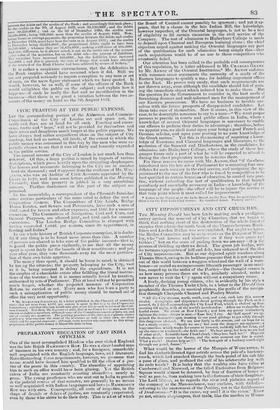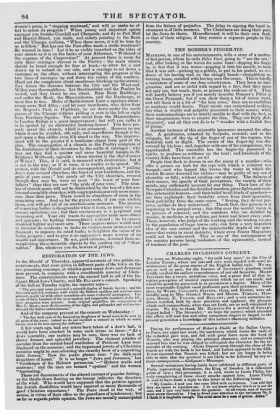CITY IMPROVEMENTS AND CITY CHURCHES.
THE Morning Herald has been lately making such a prodigious outcry against the removal of City Churches, that we began to think that nothing short of the destruction of the whole farest ef steeples that adorns the north bank of the Thames between Black- friars and London Bridge was con :emplated. For aught we know, the Bridge Committee may be as in-a t iate as the Dragon of Want- Icy, who "eat houses and churches as if they were geese oral turkies ;" but on the score of pulling down we are easy—it is the process of iffiffiling up that we dread. The great job bridge, with its tortuous approaches of hill and dale, has sickened us of the Asa of City improvements. But as our dejected spirit wanders along Thames Street, owing to its bodiless presence that it is not squeezed out of this world between a waggon-wheel and the wall of a ware- house—or seated au unim personate fifteenth passenger in an omni- bus, cooped up in the midst of the Poultry—the thought occurs to us how many persons there are who, similarly situated, make a vow never to visit the Cy again without a compulsory cause. A lively, dashing young citizen, who is evidently, by his style a member of the Thames Yacht Club, in a letter to the Herald tints graphically describes, in nautical phrase, the peril3 of the naviga- tion through Cheapside Channel and Poultry Straits.
"All the City streams, north, south, east, and west, rush into this narrow rivulet. As captains and shipowners dread getting through the Pool, as it is termed, do I dread approaching this City Land Pool, which is choked up from morning till night, with all the world's merchandise. Allow me to describe the fearful event. We arrive at Bow Church ; and here my grootn instinctively tightens the reins—danger is near= Ease her,' 1 cry. At half speed' we ap- proach the destructive spot, trusting to our good pilotage to get safely through this dangerous channel. We are now fairly in the stream, and no hope for on
but a steady course. Steady we are ;' but soon the dangers are apparent ; a huge omnibus, which tracks her course to leeward, suddenly Itiffs her helm, and up she comes to windward—the fickle one! We hear away, but here we are foul of other craft. In terrific haste I bawl aloud, Stop her, hack her ! ' Hope sits forlorn, despair usurps her throne, and the next moment our fate is sealed. What a crash ! Heaven help US!!! 'The bowsprit of a hackney-coach right through our panel, James! "
What would be the horror of the Marquis of Woitens-rea, to find his rhubarb-liveried tiger astride across the pole of a hackney- coach, which had smashed through the back-panel of his cab like a pane of glass, and profaned the calf of his aristocratic leg with its rude touch? It is lucky that the wealthy cits have villas at Camberwell and Norwood, or the titled Exclusives from Belgravc Square would almost be deterred, by fear of fracture of bones as well as pant-Is, from making love to the fortunes of their daughters. The Lord Main;:, as he regards the civic and plebeian aspect if the company at the Mansionhouse, may exclaim, with Othello— referring to the narrowness of the Poultry, not to the faithlessness of Deslemona—" It is the cause, my soul! it is the cause." Know ye not, citizen shopkeepers, that trade, like the maiden in IV ORD• WORTH'S poem, is "stepping westward," and will ye make no ef- fort to arrest its progress ? When young and impatient spirits amongst you forsake Cornhill and Cheapside, and tly to Pall Mall and Regent Street, you smile, and calmly pointing to the Bank and the 'Change, exclaim, "When these move, it will be time for as to follow." But has not the Post-office made a stride westward? Be warned in time Let it be as visibly inscribed on the sides of
your streets as it is on the backs of your Aldermen, "Widened at the expense of the Corporation!" At present there is room for only three carriages abreast in the Poultry : the main streets should be broad enough for four at least,—to allow for a cart drawn up to unload on one side, and a carriage to set down a customer on the other, without interrupting the progress of the two lines of carriages up and down the centre of the roadway. Heed not the complaints about omnibuses blocking up the streets; they lessen the distance between the City and the West-end. Widen your thoroughfares. Let Bucklersbury and the Poultry be zinited, and they twain be one street. Rase Bank Buildings; and suffer the Bank, the Mansionhouse, and the Exchange, to meet face to face. Make of Bartholomew Lane a spacious street ; sweep away Bell Alley ; and let your merchants, who drive from the Regent's Park or Highbury, be set down under the north piazza of the 'Change without pulling a rein to the left or right from Finsbury Square. The new street from the Mansionhouse to London Bridge is a great improvement ; but will you suffer it to be spoiled by an obstructive banking-house? You have pro- perly saved the church, which is an ornament. Remove no one where it can be avoided, old, ugly, and superfluous though it be; and spare a fine edifice even if it stand in the way. The improve- ment will be the greater if a handsome object form part of the plan. The congregation of a church in the Poultry complain of the disturbance of their devotions by the rattle of carriages : why may not they find a quieter and more beautiful temple in St.
Stephen's Walbrook, opposite ; whose interior is the clufdteuvre at' WREN? This, it is said, is menaced with destruction : but it is not in the way; or if it were, it is worthy to be spared. We protest, with the Herald and its correspondent, against " pulling down your revered churches, the boast of your forefathers, and the pride of your sons :" but surely all the City churches, revered
though they may be, were no more "the boast of your fore- fathers" than they are now "the pride of your suns." The num- ber of church-goers will not be diminished by the loss of a few use- less and unsightly churches, with congregations scarcely more nume- rous than their pews. There would be abundance of room in the remaining ones. And as for the grave-yards, if you can abolish them, you will get rid of an unwholesome nuisance. The process of removing bodies is disagreeable while it lasts, as many very ne- cessary operations are ; but their continuance is a perpetual and increasing evil. Your city wants its approaches made more direct and spacious; its leading thoroughfares widened ; its by-streets rendered lighter and more airy. These improvements would tend to increase its residents; to make its visitors more numerous and frequent; to improve its retail trade; to heighten the value of its house property ; and to give it an appearance more worthy of its wealth and importance. Be not, good citizens, deterred from ac- wraplishing these desirable objects by the canting cry of " dese- cration." But, whatever you do, beware of jobbery.















 Previous page
Previous page